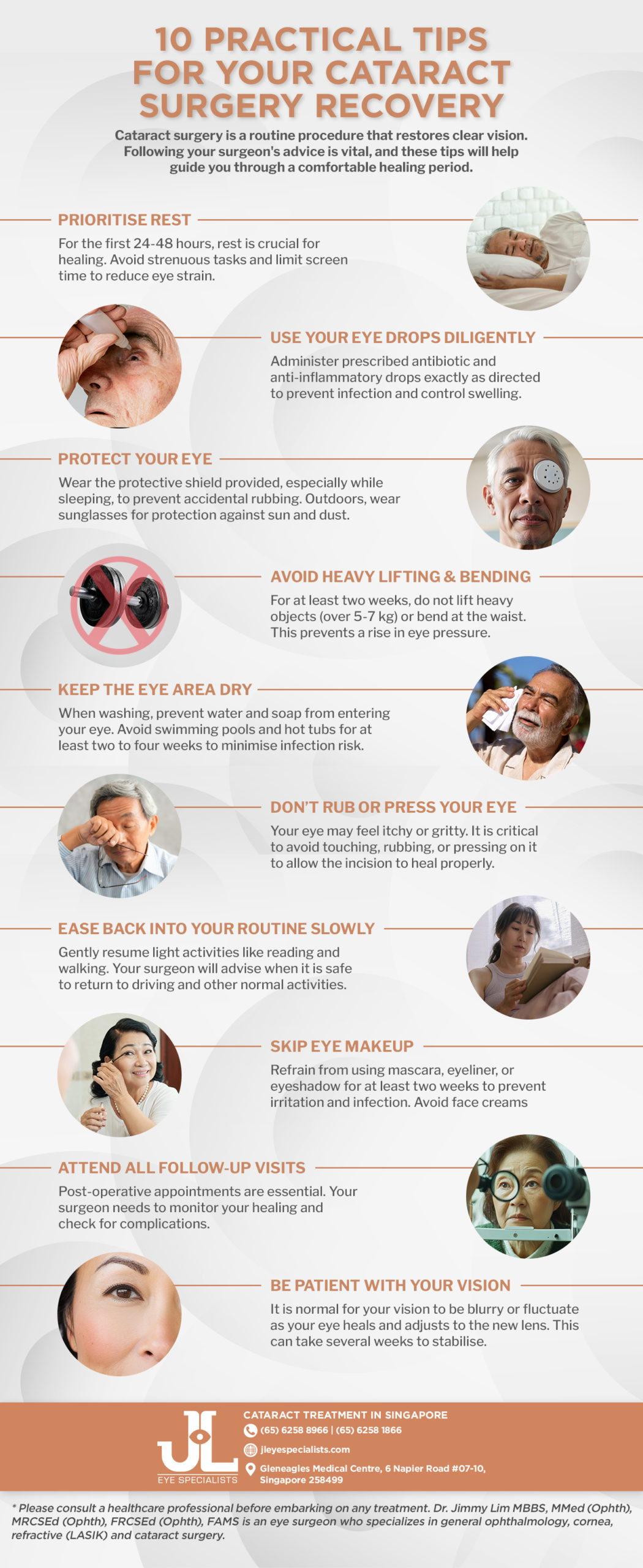CATARACT SURGERY RECOVERY: Your Guide to a Smooth
Healing Process
Deciding to proceed with a cataract operation is a significant step towards reclaiming a world of vibrant colour and sharp detail. It’s a choice for clarity, independence, and a renewed enjoyment of life. However, it’s completely natural to have questions and perhaps a few anxieties about the period that follows the procedure: the recovery. What exactly should you expect? How long will it take? What can you do to ensure the best possible outcome?
This guide is designed to walk you through the cataract surgery recovery process, offering a clear timeline and practical tips for a smooth and comfortable healing journey. While the prospect of surgery can be daunting, understanding the recovery phase can empower you and alleviate many common concerns. Remember, this information serves as a general guide, and a detailed discussion with your ophthalmologist is crucial for advice tailored to your specific health needs.
The First 24 Hours: The Immediate Post-Op Period
The journey to clearer vision begins the moment your cataract eye surgery is complete. As a day surgery procedure, you will be able to return home shortly after. In these initial hours, your eye will begin its natural healing process.
It is normal to experience some blurriness or hazy vision initially. Your eye may also feel a bit scratchy or gritty, as if there is sand in it, and it might be watery. A common experience is increased sensitivity to light. These sensations are a normal part of the healing process and typically subside within a day or two.
Your surgeon will place a protective shield over the operated eye, which you will be instructed to wear, especially while sleeping, for the first two weeks. This shield is crucial as it prevents you from accidentally rubbing or putting pressure on your eye, which is vital for undisturbed healing. Rest is the most important activity during this initial 24-hour period. Taking it easy and getting plenty of sleep will give your body the best start for recovery.
The First Week: Adjusting to a Clearer World
Within the few days following your cataract operation, you will likely notice a significant improvement in your vision. The initial blurriness will start to fade, and the world may appear brighter and colours more vivid. This is because you are now seeing through a new, perfectly clear intraocular lens (IOL).
During this first week, you will have a follow-up appointment with your surgeon, usually a day or two after the procedure. This allows your doctor to monitor the initial healing.
Adherence to your prescribed eye drop regimen is critical during this phase. Your surgeon will prescribe antibiotic and anti-inflammatory drops to prevent infection and control inflammation. Following the schedule precisely is one of the most important things you can do to ensure a complication-free recovery.
While you can resume light activities like reading and watching television almost immediately, there are some key restrictions to observe:
- Avoid Bending and Heavy Lifting: Do not bend at the waist or lift anything heavy for at least the first week. These actions can increase pressure inside your eye. When you need to pick something up, bend with your knees.
- Avoid Getting Water Into The Eyes: Be careful when showering or washing your hair to prevent soap and water from getting into your eye.
- No Rubbing: The urge to rub an itchy eye can be strong, but you must resist it. Rubbing can disrupt the healing process.
- Avoid Irritants: Steer clear of dusty environments, smoke, and wind as much as possible to prevent irritation. It’s also advised to avoid gardening and dusting for the first week or two.
The Weeks Beyond: Stabilisation and Full Recovery
Your vision will continue to improve and stabilise over the following weeks. While many people see very well within the first week, it can take anywhere from four to eight weeks for your eye to heal completely and your vision to reach its final, stable state. During this time, it’s normal for your vision to fluctuate slightly from day to day.
You will have additional follow-up appointments, typically at the one-week and one-month marks, to monitor your progress. If you require glasses for reading or for distance vision after the surgery, your doctor will advise when your vision is stable enough for a new prescription, usually after a month or more.
Most people can return to the majority of their normal activities, including work, within a few days to a week, depending on the nature of their job. However, more strenuous activities and certain environments should still be avoided for a little longer. It’s generally recommended to wait for at least two to four weeks before resuming vigorous exercise, swimming, or using hot tubs to minimise the risk of infection and injury.
Potential Side Effects: What’s Normal and When to Seek Advice
The vast majority of cataract surgeries are successful with no complications. However, it’s helpful to know what mild side effects can occur and what signs warrant a call to your doctor.
Common and Usually Temporary Side Effects:
- Gritty or Itchy Sensation: This is common and can be managed with lubricating eye drops if recommended by your surgeon.
- Light Sensitivity: Wearing sunglasses outdoors, even on overcast days, can help manage sensitivity in the weeks following surgery.
- Glare and Halos: You may notice halos around lights, especially at night. This is your brain adjusting to the new lens and typically resolves over time.
- Floaters: Some people may notice small specks or “floaters” in their vision, which often settle and become less noticeable over time.
While complications are rare, it is crucial to contact your eye surgeon immediately if you experience any of the following symptoms:
- Worsening or severe eye pain that is not relieved by simple pain medication.
- A significant decrease in vision.
- A sudden increase in redness or eyelid swelling.
- Pus or thick discharge from the eye.
- A sudden shower of new floaters or flashes of light.
Essential Tips for a Seamless Healing Journey
Your active participation in the recovery process plays a huge role in the final outcome. Here are some key tips for a smooth cataract surgery recovery:
- Follow Doctor’s Orders: This is the most critical rule. Use your eye drops exactly as prescribed and attend all your follow-up appointments.
- Protect Your Eye: Wear your protective shield at night and sunglasses during the day. This simple step provides a physical barrier against injury and light sensitivity.
- Prioritise Rest: Allow your body and your eyes ample time to heal, especially in the first few days. Adequate sleep is a powerful component of recovery.
- Practise Good Hygiene: Always wash your hands thoroughly before applying eye drops. Avoid wearing eye makeup for at least the first week to prevent bacteria from entering the eye.
- Stay Patient: Remember that healing is a gradual process. Your vision may fluctuate initially, so give your eyes time to adjust and fully heal.
Navigating Financials and Insurance for Your Surgery
Understanding the financial aspects of cataract surgery is a key part of the preparation process. In Singapore, there are several schemes available to help manage the costs. Typically, the clinic or hospital where you have your procedure will have financial counsellors who can assist you with the necessary paperwork and claims process, making it more straightforward.
Here’s a brief overview of the primary financing options:
- MediShield Life: This is a basic health insurance plan for all Singapore Citizens and Permanent Residents. It provides coverage for cataract surgery, although claim limits are in place and may not cover the full cost, especially in private healthcare settings.
- Integrated Shield Plans (IPs): Many Singaporeans have IPs to supplement their MediShield Life coverage. The extent of coverage for cataract surgery varies depending on your specific plan and any riders you may have. It is essential to check your policy for details on co-payments or deductibles.
- MediSave: Singapore Citizens and Permanent Residents can use their MediSave accounts to help pay for their cataract surgery. You may also be able to use the MediSave accounts of immediate family members, subject to prevailing withdrawal limits.
Before your surgery, it is advisable to have a discussion with the clinic’s financial advisor to get an estimate of the costs and a clear understanding of the claims procedures. Be sure to check with your IP insurer about whether pre-authorisation is needed and if your chosen doctor is on their approved panel to ensure your claims are processed smoothly.
Partnering With You on Your Path to Clear Vision
The success of a cataract operation extends beyond the operating room. It encompasses the entire journey, from your initial consultation to your full recovery. At JL Eye Specialists, we are committed to being your partner throughout this transformative process. Our goal is to ensure your experience is as comfortable, safe, and reassuring as possible.
Dr. Jimmy Lim, with his extensive experience and dedication to patient-centric care, leads our team in providing personalised treatment plans. We understand that every patient’s needs are unique, and we take the time to address your concerns and tailor your care accordingly. Your journey to restored vision is a significant life event, and our team is here to provide the expert guidance and support you deserve.
If you are considering your options for cataract treatment and want to understand more about the procedure and recovery, we invite you to take the next step. Schedule a comprehensive eye examination with us to receive a thorough assessment and discuss a course of action that is right for you.
Please contact us at (65) 6258 8966 or send us a message on WhatsApp at (65) 8163 2807 to book your consultation.
Related Post:
More Topics to Explore:
Relevant Services:
Our Doctor

DR. JIMMY LIM
Dr. Jimmy Lim is a top ophthalmologist for cataract eye surgery in Singapore, offering over 20 years of expertise in cataract treatment and management.
Gleneagles Medical Centre
6 Napier Road #07-10,
Singapore 258499
Phone: +65 6258 8966
Fax: +65 6258 8766

JL Eye Specialists is an ophthalmology clinic in Singapore that specialises in general ophthalmology, cornea, refractive (LASIK), and cataract surgery.
To cover the expenses that you may incur, we accept several corporate and international insurance policies. If you have any of the insurance plans at this side, please let us know when you schedule an appointment with us. For more questions, feel free to contact us at +65 6258 8966.






